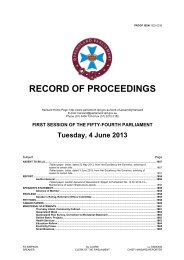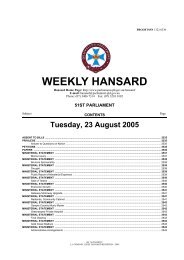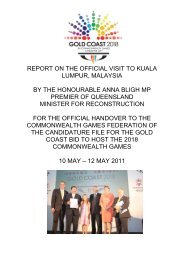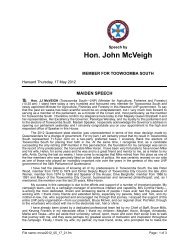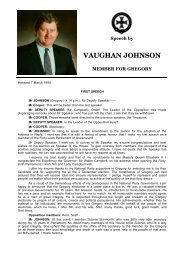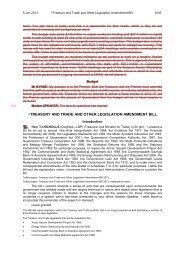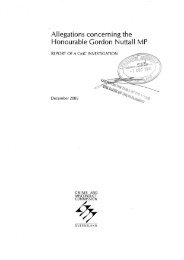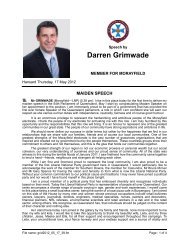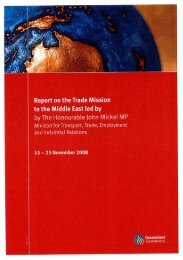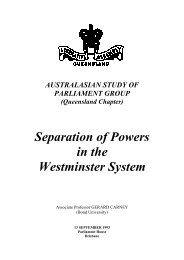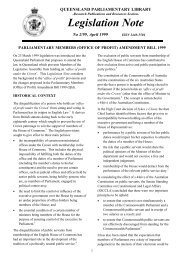Full transcript - Final - Queensland Parliament - Queensland ...
Full transcript - Final - Queensland Parliament - Queensland ...
Full transcript - Final - Queensland Parliament - Queensland ...
Create successful ePaper yourself
Turn your PDF publications into a flip-book with our unique Google optimized e-Paper software.
9 Mar 1999 Trans-Tasman Mutual Recognition (<strong>Queensland</strong>) Bill 351<br />
that the rest of the world will go away. It does<br />
not work that way, and not one job will be<br />
created by taking the path that One Nation<br />
suggested today.<br />
Hon. P. D. BEATTIE (Brisbane Central—<br />
ALP) (Premier) (3.19 p.m.), in reply: I thank<br />
honourable members for their contribution to<br />
this debate. In particular, I thank the<br />
Opposition for its support for the Bill. I will not<br />
respond to the point that the Leader of the<br />
Opposition made about the delay with this Bill.<br />
I think he waited two years before he<br />
introduced it, but those trivial matters do not<br />
deserve to be raised in this House. As he<br />
knows, I promised new standards and I do not<br />
intend to raise those sort of issues.<br />
Having said that, the Leader of the<br />
Opposition did raise some interesting points in<br />
relation to National Competition Policy, and by<br />
and large I share his view in relation to them. I<br />
think I should advise the House that I have<br />
written in the strongest terms to the Prime<br />
Minister, urging him to review the role and<br />
authority of the National Competition Council. I<br />
have implemented policies which ensure that<br />
only those competition reforms which pass a<br />
public benefit test will be implemented. I have<br />
maintained <strong>Queensland</strong>'s position in respect of<br />
major reforms to achieve our competition<br />
payments without selling off all our assets, as<br />
they have in Victoria. This is a very important<br />
point.<br />
In many respects the sale of public assets<br />
in Victoria, such as the electricity industry, is<br />
going to deprive future generations of their<br />
opportunity to control that industry in their own<br />
State. My concern is that it will be controlled by<br />
the boardrooms of New York and London, and<br />
I do not think that is in the interests of regional<br />
development or Australian development. In<br />
particular, I think National Competition Policy<br />
works very much against States such as<br />
<strong>Queensland</strong>. If one considers that Melbourne<br />
has something like 70% of Victoria's<br />
population, one sees that changes that can be<br />
made in smaller States—and in a sense it is<br />
almost a city State, if you look at the size of<br />
Melbourne—cannot be made in States such<br />
as <strong>Queensland</strong>, where only approximately<br />
46% of the population live in the capital city.<br />
Therefore, when one is trying to maintain<br />
services to regional and country <strong>Queensland</strong>,<br />
there must be Government control of natural<br />
assets or resources, such as the electricity<br />
industry. Water is another one. At the moment<br />
we are constantly battling with the<br />
Commonwealth over water. As the former<br />
Premier will know, this was an issue that he<br />
had to deal with. I know the difficulties that he<br />
had from what I have seen; we are having the<br />
same difficulties, because we do not want to<br />
see people out there paying for water which is<br />
going to undermine their ability to survive.<br />
The honourable member for Burnett<br />
spoke about this—one of the things that I put<br />
on the hold. Had the National Competition<br />
Policy gone ahead in letter form, a lot of<br />
farmers around Bundaberg—and I know the<br />
member for Bundaberg would share this<br />
concern as well—would have been the first hit.<br />
I would not, and the Cabinet would not, let it<br />
go ahead for that very reason. We were<br />
concerned about what it meant. We have<br />
written to the Prime Minister. There have been<br />
some changes in terms of the implementation<br />
program, and I want other changes in terms of<br />
National Competition Policy so the farmers in<br />
the honourable member's area are not<br />
disadvantaged. They do not generally support<br />
my side of politics. That has nothing to do with<br />
it. This is bigger than politics; this is about<br />
getting a system of Government where we, in<br />
fact, control it.<br />
I totally agree with one of the things that<br />
the Leader of the Opposition said. It will stun<br />
him as much as it will stun other members of<br />
this House. The control of National<br />
Competition Policy should be taken back to<br />
the Premiers. It should not be handled by<br />
some independent body over which the duly<br />
elected people have little control. We have to<br />
remember in all these things that National<br />
Competition Policy on its own can lead, as it<br />
has in Britain, to large private monopolies in<br />
the control of water and other natural assets, if<br />
one wants to put it in those terms. What is the<br />
point of having water in the control of a private<br />
monopoly? How does that improve the lot of<br />
people's lives? It does not.<br />
At least if someone is unhappy about the<br />
electricity supply they are getting or unhappy<br />
about the quality of the water, what do they<br />
do? They can get on to their local member of<br />
<strong>Parliament</strong>, they can turn it into a public issue<br />
if it is of such significance and they can<br />
change Government. Governments have been<br />
changed on the basis of the provision of these<br />
sorts of services—important, life threatening<br />
services in some circumstances, or certainly<br />
services that impact on people's quality of life.<br />
Governments have been changed on the<br />
basis of them. That is the ability of an<br />
electorate to change the Government if they<br />
do not like the services they are getting.<br />
National Competition Policy removes the<br />
control, and we need to do something about<br />
that. I have to say that it is time that all sides<br />
of politics in this country at a State and Federal



